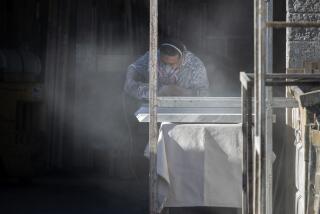Worker loses part of finger at firm cited for safety violations
- Share via
Another employee has lost part of a finger at Bimbo Bakeries, a company with plants statewide whose record of workplace accidents was highlighted by The Times last year as an example of inaction by California health and safety officials.
In addition, the company failed to disclose the 2007 amputation of a different worker’s finger, officials at the Division of Occupational Health and Safety said last week.
That brings the company’s total number of amputations to nine since 2003, when a worker lost most of her arm in a bread machine.
“I’m just flabbergasted,” said Frances Schreiberg, a board member of Worksafe, a nonprofit that advocates for worker safety. “This company doesn’t have a grip on how to implement an effective safety program.”
Bimbo officials declined to comment.
In an investigation last fall, The Times found that seven employees had lost parts of fingers or a limb in accidents at California plants over the last seven years. In six of those cases, investigators found that machines did not have proper guards to prevent employees from reaching in, officials said. But many of the penalties levied by the health and safety division, known as Cal/OSHA, were dismissed or reduced on technicalities by the agency’s appeals board, so the company wasn’t required to immediately fix the problems.
In October, after inquiries from The Times, Cal/OSHA sent its “high hazard” unit to Bimbo plants in Escondido, Montebello, South San Francisco and Elk Grove. Inspectors found equipment that lacked proper guarding. The division fined Bimbo $230,000, including more than $120,000 in rarely issued “willful” citations for companies that intentionally disregard safety regulations. Bimbo has appealed those charges.
Then, in January, an employee at the Elk Grove plant, Antonio Guido, lost part of his finger in a tortilla machine that investigators later found did not have proper guards.
Inspectors cited “the willful failure of Bimbo Bakeries to guard the openings around … the tortilla production lines” and insufficient training of workers, among other things. The division recommended $123,000 more in fines, including more willful citations.
Bimbo has appealed those citations too.
Through his union representative, Guido declined to comment. The worker was laid off after the accident, according to union representative Jerry Gill.
Bimbo Bakeries USA, based in Horsham, Penn., makes a number of well-known brands of breads, tortillas and pastries, including Orowheat, Tia Rosa and Entenmann’s.
While investigating Guido’s injury, inspectors learned of the unreported accident in 2007. Bimbo officials disclosed it in an April letter to Cal/OSHA, calling the omission a mistake, said Amy Martin, chief counsel for the agency.
Under state law, employers are required to report serious injuries within eight hours. It took Bimbo two days to report Guido’s injury.
Martin said that the agency has been pushing Bimbo for months to improve safety and that company officials have agreed to take action.
Among the steps Bimbo officials pledged to take, Martin said, is to make sure safety requirements are relayed by upper management to supervisors on the production lines. Supervisors may not have been encouraging workers to stop the machinery to clear dough that becomes stuck, she said. In many of the accidents, workers put their fingers in machines that were still running.
“We hope they will pursue the changes they say they are going to,” Martin said. “The big win here would be to stop it. It’s one thing to get money penalties. It’s better to not amputate anyone’s fingers.”
In one of the cases cited by The Times last fall, Rosa Frias lost most of her arm when it was sucked into a running bread machine in South San Francisco in 2003.
Cal/OSHA fined Bimbo $21,750, but the case was dismissed after an administrative law judge working for the appeals board said the agency could not prove that its inspector had permission to enter the factory. The inspector had retired and was not available to testify at the hearing.
This summer the board reversed that decision, reinstating the fines in the Frias case.
jessica.garrison@latimes.com
More to Read
Inside the business of entertainment
The Wide Shot brings you news, analysis and insights on everything from streaming wars to production — and what it all means for the future.
You may occasionally receive promotional content from the Los Angeles Times.










